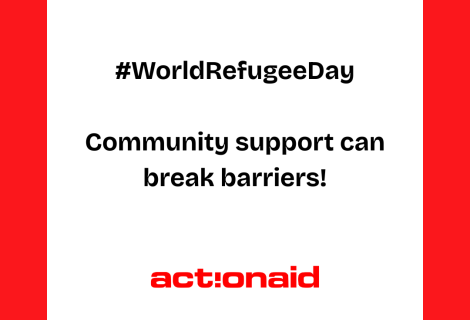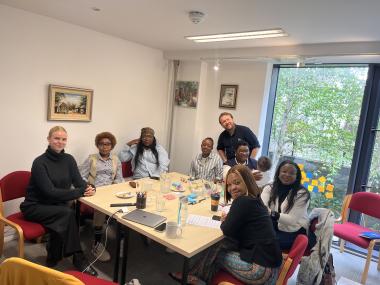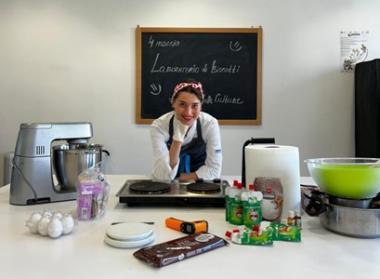Community support can break barriers: stories from women on the move in Ireland and Italy

This year’s World Refugee Day is dedicated to the theme of solidarity. Solidarity is not a form of top-down charity, but it is a transformative way of breaking barriers, centring the leadership of refugees and migrant communities and supporting them in addressing the many obstacles encountered in their journey.
In Europe, migrants and refugees encounter challenges throughout their journey to European Member States and continue to face persistent difficulties upon arrival. Migrant women, in particular, are exposed to specific gendered discrimination: access to international mobility is not gender neutral and neither is the stay in a host country. Women can face gender biases in border management processes and refugee status determination, labour migration pathways can be very restricted and lead to downward occupation mobility, while strict family reunification criteria strongly impact women. Once in Europe, women migrants face higher probability to stay in precarious and informal work, face obstacles in labour market inclusion and are generally exposed to intersectional forms of discrimination based on their status, gender and racial background.
To break these barriers, solidarity can be a crucial, transformative tool of resistance and empowerment. In ActionAid’s work, solidarity means centring women migrants’ voice and leadership in co-designing services, policies and advocacy and co-managing projects. It means working towards inclusive, intersectional and resilient communities that can claim and defend their rights.

Feminist solidarity in Ireland and Italy
Our work in Ireland is centred around supporting lone parents who have received or are currently applying for international protection. These women all have experience of living in Direct Provision. Direct Provision is a system established in 2000 that provides access to accommodation, food, and basic necessities in designated centres for people seeking international protection. The system has been widely criticised because, while being designed as a short-term solution, most people end up spending prolonged amounts of time there, in overcrowded and unhealthy living conditions, at risk of social isolation, precarious physical and mental health conditions that particularly impact the most vulnerable.
Living in Direct Provision can be very challenging for lone parents, who raise their children while struggling to establish a sense of belonging and community in a system designed for exclusion. As Janet, participant and advisor in ActionAid’s project said:
“Coming from Nigeria, one of the biggest challenges I faced in Ireland was the feeling of isolation. As a migrant, it can be hard to find where you belong especially when you don’t see yourself reflected in the systems around you. Navigating services, finding safe spaces, and dealing with assumptions about who you are or what you bring it can be overwhelming”
In particular, a recurrent issue raised is the difficulty in accessing housing, specifically when transitioning from Direct Provision to private accommodation. Lone parents face discrimination at every step when looking for their private accommodation, from sexism to racism to classism, making it even more difficult to get their own home in the midst of an already challenging housing crisis in Ireland. Rispa, also active in ActionAid’s project, said
“The challenges I have experienced is not being able to find a home for myself and my children. I have always tried to remain positive that one day I will find one.”
To face these challenges, our work focuses on empowering lone parents to engage in advocacy to improve their living conditions, rights, and overall well-being. This starts from creating strong communities where people can share their struggles, help each other in finding solutions, and feel seen as whole persons, and not just through their migratory status. Janet said:
“I refused to stay silent or invisible. I connected with other migrants and social organisations especially women, who shared similar experiences. That sense of community helped me find my voice. We come from different places and life stories, but we are united in our desire to make Ireland more inclusive and just. The other advisors inspire me daily. We share knowledge, challenge each other, and build strength together. It’s one of the few spaces where I feel fully seen not just as a migrant woman or an advocate, but as a whole person with something meaningful to offer”
The support, energy and strength received by a community of peers creates hope for the future. In particular, for the women, lone parents, it also creates hope for their children: “what gives me joy is seeing my children thrive despite the barriers they've had to navigate while spending their formative years in Direct Provision” said Ola. Janet, Rispa and Ola are just some of the women advisors and participants leading ActionAid’s work in Ireland. Through their strength and solidarity, they are paving the way for each other and for a more inclusive Irish society.

In Italy, we work with young people and women with migratory experience in low-protection sectors like agriculture and domestic work, who are exposed to exploitative working conditions. Employment outcomes are strictly linked to the skills-based approach to work permits promoted by Italian and EU migration policies. Low-protection sectors are highly gendered and are often characterized by precarious – often temporary – migration status and working conditions that create and reinforce gender vulnerabilities. Our work with migrant women in these sectors is based on a participatory and transformative approach: through shared governance of the project’s activities and outcomes, the women are empowered to develop policy and advocacy asks, claim their rights and advocate for inclusive and integrated public services.
Olga Dianova is one of the women who has been active in ActionAid’s projects. Olga arrived in Italy in 2022, with her two children, after fleeing the war in Ukraine. In Ukraine, she used to work as pastry chef and cake designer. When she arrived in Italy, Olga faced many struggles in finding housing, accessing the health system and balancing work with the family care load. Finding a house was particularly challenging due to multiple discriminations related to her condition as a foreigner, single mother without a stable employment contract. Accessing the health system was also particularly challenging due to the temporary nature of the protection status she received (activated through the EU Temporary Protection Directive). She was prevented from booking medical appointments for months, given the imminent expiry of her status and therefore also of the registration with the national health service. Despite these challenges, Olga has now managed to kickstart her life in Italy. Thanks to a family that welcomed her and acted as her guarantor, she managed to find a suitable accommodation. Through ActionAid’s project, she started the recognition process of her two degrees in Finance and Food Technology obtained in Ukraine and acquired a scholarship which enabled her to enrol and continue her degree course in Food Technology at the University of Bari. She currently works at a pastry shop in Bari and dreams to open her own pastry shop in the future.
The story of Olga is a story of resilience built and nurtured in communities: communities that support each other in navigating the multiple challenges in accessing health, housing, work or education. When people – whatever their status – are supported instead of being pushed into isolation, they can thrive and contribute to build stronger, more inclusive societies.
Solidarity can be transformative: when centering the leadership of migrant women, it can break barriers of racism, patriarchy, legal status and bring about change. As Janet, from Ireland, says:
“My joy comes from seeing change happen no matter how small. When someone feels heard because I spoke up, or when a mother who felt alone finally finds support, that gives me strength. My Nigerian heritage gives me deep pride and resilience. I come from strong women, and I carry that legacy with me. Working on projects around FGM and lone migrant parent advocacy connects me to a purpose larger than myself. It reminds me that my experiences both the pain and the healing can help others find a way forward too”